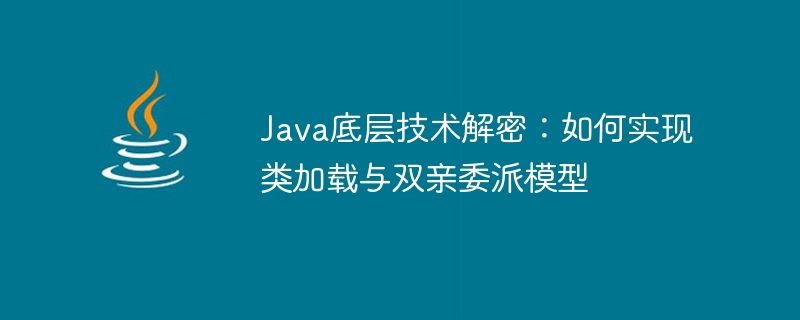Home >Java >javaTutorial >Decryption of Java underlying technology: how to implement class loading and parent delegation models
Decryption of Java underlying technology: how to implement class loading and parent delegation models
- 王林Original
- 2023-11-08 22:12:48822browse

Decryption of Java's underlying technology: How to implement class loading and parent delegation models
Introduction:
As one of the most widely used programming languages, Java is widely used in development High-quality applications play a vital role. At the bottom of Java, a very important technology is the class loading and parent delegation model. This article will lead readers to have an in-depth understanding of the Java class loading process and how to implement the parent delegation model, while providing specific code examples.
1. Class loading process
During the running process of a Java program, the Java source code first needs to be compiled into a bytecode file, and then the bytecode file is loaded into the Java virtual machine through the class loader. (JVM). The class loading process can be divided into the following steps:
- Loading: Load the bytecode file of the class into memory.
- Linking: Link the loaded bytecode file with the existing classes in the Java virtual machine.
a) Verification: Verify the legality of the bytecode file of the loaded class to ensure that it will not be maliciously tampered with.
b) Preparation: Allocate memory space for static variables of the loaded class and set default values.
c) Resolution: The process of converting symbol references in the loaded class into direct references and resolving symbol references. - Initialization (Initialization): Perform the actual initialization operation on the static variables of the loaded class.
- Using: You can use classes that have been loaded and initialized.
2. The concept of the parent delegation model
The parent delegation model is an implementation method of the Java class loading mechanism. According to this model, when a class loader loads a class, it will first delegate it to the parent class loader for loading. Only when the parent class loader cannot find the class, it will be loaded by the current class loader. This ensures that classes are loaded in order and avoids the problems of repeated loading and version conflicts.
3. How to implement the parent delegation model
In Java, to implement the parent delegation model, you need to inherit the ClassLoader class, override the method of loading the class, and implement the delegation mechanism in the overridden method.
The following is a sample code:
public class MyClassLoader extends ClassLoader {
@Override
protected Class<?> loadClass(String name, boolean resolve)
throws ClassNotFoundException {
synchronized (getClassLoadingLock(name)) {
// 首先检查类是否已经被加载
Class<?> c = findLoadedClass(name);
if (c == null) {
try {
if (getParent() != null) {
// 如果父类加载器存在,则委派给父类加载器加载
c = getParent().loadClass(name);
} else {
// 如果父类加载器不存在,则由自己加载
c = findClass(name);
}
} catch (ClassNotFoundException e) {
// 如果父类加载器也无法加载,抛出ClassNotFoundException异常
// 这样才能保证双亲委派模型的顺序
c = findClass(name);
}
}
if (resolve) {
resolveClass(c);
}
return c;
}
}
// 其他自定义的方法和逻辑
}In this sample code, we customize a MyClassLoader, inherit the ClassLoader class, and override the loadClass method. In the loadClass method, it will first check whether the class to be loaded has been loaded. If it has not been loaded, it will be delegated to the parent class loader for loading. If the parent class loader is empty, it will be loaded by itself.
4. Summary
The Java class loading and parent delegation model is a very important part of Java's underlying technology. It ensures the loading order of classes and avoids the problems of repeated loading and version conflicts. In actual development, it is very helpful to master the class loading process and how to implement the parent delegation model. It can better understand the internal mechanism of Java and solve some problems related to class loading.
Through the introduction of this article, readers should have a deeper understanding of the class loading and parent delegation models in Java's underlying technology. At the same time, it also provides readers with some implementation guidance to help readers better apply and understand these concepts in actual projects.
The above is the detailed content of Decryption of Java underlying technology: how to implement class loading and parent delegation models. For more information, please follow other related articles on the PHP Chinese website!

